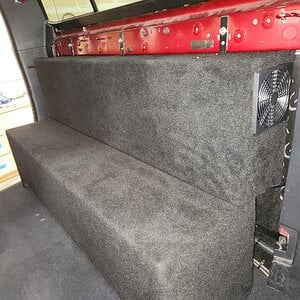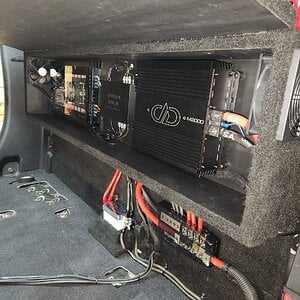Let me start by saying that your 2000-watt amplifier is not 2000 watts. I don’t care what the ‘birth certificate’ says. I don’t care what the test reports say. It does not deliver 2000 watts in your vehicle. Certainly not with the music you’re listening to. And the reason is part of the reason I get so upset over this topic. Two words: Ohm’s Law. It is one of the rare moments in life, let alone mobile audio, that we have a law that helps us determine what is real. Let me explain.
In order to deliver a true, continuous 2000 watts of power in your standard automobile, you would need more than that much power from the vehicle electrical system. I know this is true because of Ohm’s Law. With Ohm’s Law, we know that Power (in Watts) is equal to Voltage (E) times Current (I). Your car has a 12-volt charging system (E = 12) and even a heavy-duty alternator in your vehicle is going to have about 140 amps of current available (I = 140). So, using P = I * E, we find that P = 140 * 12 or P = 1680 Watts. Not 2000 watts. And remember, this is the available power in Watts from the entire electrical system, not just what is available for your amplifier.
But I know what you might be thinking; “But when my vehicle is running, it is not 12 volts...it is higher”. Fine. Let’s run numbers again. Start the engine. Measure the battery. What do you get? 13 volts? Maybe 14? Let’s use the famous 14.4 reading (E = 14.4). So now we have P = 140 * 14.4 which works out to be 2016 Watts. “Ah HA!” you scream! “2000 Watts, baby! In your FACE!” Not so fast. This is, remember, total available power for the entire electrical system, not just the power for your amp. But even if that was the case, there is a very important factor left out of this equation that needs to be considered; Efficiency. This magical amp of yours would have to be 100% efficient. It’s not. Nothing is. But even if it were, your 2000 watts would not hold up long enough to be meaningful to you. After the first impulse of music, your electrical system is going to be pushed (or is it pulled?) to its limit and will need to dip into that ever popular reserve tank also known as your battery. That is where things can get ugly and fast. The battery can only provide so much power for so long. Once you dip into the power from the battery, it becomes a load on the alternator, which reduces the amount of power available for your magical 2000-watt amplifier. You may be able to cheat for brief moments in time, but eventually you will pay the price. That price may be a failed battery, a failed alternator or a failed amplifier. Not necessarily in that order or in isolation. How quickly this will happen can and will vary on too many factors to list here, but it is not a matter of if it is a matter of when because it will happen.
You might be thinking that I am insane. You are probably right, but when it comes to this topic, I may not be. You might be wondering how is it that you’ve had this magical amp in your car without any failures as listed above for years. The simple answer is right where we started your 2000 amplifier is not 2000 watts. We were doing all of our math based upon the presumption of “what would I need to make 2000 watts of power”. Let’s look at it differently. Let’s look at it from the point of view of most amplifier designs. Most amplifiers utilize what is known as an unregulated power supply. Simply put, this means that the supply voltage determines how much power the amplifier might be able to produce (assuming you have the current capacity). In other words, if you have higher supply voltage, you have higher potential output power from the amplifier. In reality, you do not have higher supply voltage so logically that means you have lower potential output power. Now if you think about that for a moment, it should occur to you that maybe, just maybe when the supply voltage is lower, the true potential of the amplifier will be lower too, and you would be right. Since we are dealing with a battery that is rated at 12.6 volts, if you were to use that for your calculations, you would see about a 30% drop in power potential (actually it is almost 40% in this case, but whose counting?). This is really not a big deal since 1200 watts is still a lot of power (we can discuss the ‘3dB rule’ another time).
You can keep looking at the numbers if you like, but the true point is that your amplifier is not doing what you think it is doing, especially when it is unregulated (as most amplifiers are). The point that drives me nuts typically shows up when working with regulated amplifiers. These designs will do whatever possible to deliver their rated power even if supply voltage sags (which it does). Knowing Ohm’s Law, if power is fixed and the supply voltage sags, the power has to come from somewhere. Any guesses? If you said, “the current must go up”, you’ve been paying attention. Let’s look at this a bit differently.
As Ohm’s Law states, P = I * E right? So, if our regulated amplifier is rated for 1200 watts as an example, and our voltage is 12 volts (it makes the math easy), we would need 100 amps of current; 1200 = 100 * 12. If, however, the voltage drops to 10 volts, in order to keep the 1200 watts, the current would have to increase to 120 amps. No free lunches here. A regulated amplifier will do whatever it takes to get you the full rated power. At some point, your electrical system may not like that, and then you may run into trouble.
Article from JL audio website
Author Steve Turrisi - Director of Training and Technical Services
Sent from my iPhone using Tapatalk


